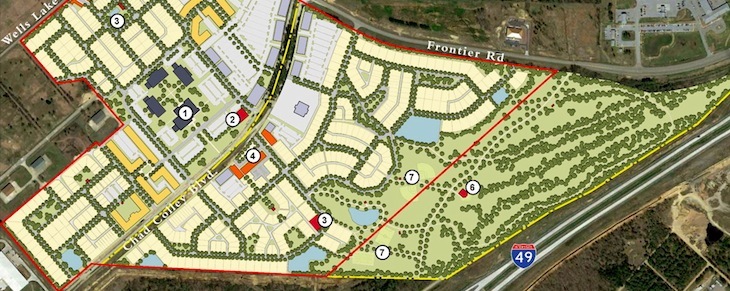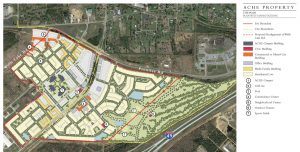Barling, Fort Smith will share ‘close to even split’ on taxable sales from medical college’s planned community
by June 27, 2017 5:09 pm 1,251 views

Arkansas Colleges of Health Education (ACHE) President and CEO Kyle Parker said the school’s new planned zoning development (PZD) announced Tuesday (June 27) in coordination with the announcement of the new college of health sciences will generate close to $26 million in annual taxable sales from the retail and hospitality industries set to grow around the school’s expanding educational centers.
From those sales, Parker expects the majority of tax benefit to hit the Barling side, though the split will be close between it and Fort Smith.
“It’s more towards Barling than it is Fort Smith because the academic programs are here (in Fort Smith),” Parker told Talk Business & Politics, but “we’re talking 55 versus 45 percent. It is very close to an even split.”
When one looks at the master plan presented Tuesday, Parker said, “you see some really big box grocery stores that are there and things that are going to drive a tremendous amount of taxable revenue located on the Fort Smith side. Quite frankly, that’s because they can sell beer and wine in a grocery store in Fort Smith, and you cannot do that under current law in Barling, and so the grocery stores that have been contacting us that we’re in final discussions with all want to be on the Fort Smith side.”
“It’s a disadvantage for Barling,” he admitted, though “for the ice cream parlors” and other non-alcohol businesses, “they want to be in that town center (on the Barling side) because that’s a really cool place to be.”
Parker said the ACHE has been contacted “by every conceivable retail thing you can imagine,” but there haven’t been any businesses finalized for the development at this time.
The reason: “We’ve just got to make sure we do it right. We have a town architect — Mike Watkins, one of the gentlemen who helped develop Seaside, Florida,” which is an unincorporated master-planned community on the Florida panhandle founded in 1981 and featured prominently in the Jim Carrey film The Truman Show. It is located in Walton County, between Panama City Beach and Destin.
“We’re going to make sure that we get the right mix,” Parker said, explaining ACHE has hired two separate consultants to handle residential housing.
The school announced plans for over 1,900 units in low-, mid-, and high-end housing along with the second college and PZD, and hired author and New Urbanism expert Robert Gibbs for help in coordinating the development with surrounding communities.

“He’s the one who has come back and said, ‘Okay, you can have x amount grocery stores, you can have x amount of movie theaters. So, like a grocery store, you can have one or two, your choice; but if you choose two, then it affects a different area. It was all done for the economic impact and what Fort Smith, Barling, Alma, Van Buren — what we can handle as far as retail is concerned,” Parker said.
There were two years of extensive studies at a cost of around $250,000 that went into the studies and “getting it right,” Parker said, “because we want people to enjoy where they live and get out more. I want somebody to walk out of their house and decide where they’re going to eat later. Think if you walked out, got around that town center, because we can have up to 10 restaurants in there, and say, ‘Would you like Mexican tonight? How about Italian? I don’t know. Let’s walk around a little bit. I’m not really hungry yet.’ I mean, come on, that’s living. That’s what living is.”
Pressed for a timeframe when the first businesses might be announced, Parker would only smile and say, “Soon.”
Parker opened up more on housing details, stating sizes would range all the way from “low square footage” and lower-priced homes to “mansion-priced bigger homes.”
“Most of these traditional neighborhood developments will fit eight houses on a single acre of land, and it’s not because you’re trying to maximize the land. You’re trying to maximize the interaction between people,” Parker said. “So a lot of these houses have front porches and they’re intentionally moved right up to the street so that you talk to people who are walking on the sidewalks, to where you get to know your neighbors. If you look at human beings, we like to converse with one another. Very few of us want to be monks. We want to get out. That’s who we are.”
On student housing, ACHE has already completed Phase I of its plan. Tuesday brought the announcement of Phase II — dubbed “The Residents” — which will be an additional $6 million investment creating 80 new units (96 beds).
With Phase I and II, the campus will host a total of 218 beds. While that falls short of the number needed to house the 600 students expected to be on campus by the time the college of health sciences opens its doors, the site’s 282 acres leaves plenty of room for expansion.
The overall development plan calls for 625 multi-family rentals, 125 multi-family for-sales, 215 single-family attached, and 1,020 “low-, mid-, and high-range single family detached” units (a total of 1,985 units).
It will also host 30 categories of retail, including apparel, department stores, grocery stores, home furnishings, jewelry, pharmacy, theaters, and liquor stores, expected to generate $19.2 million in taxable sales. Restaurant-wise, the 10 categories will include pubs, full-service, limited service, and specialty foods, estimated to generate $6.7 million in taxable sales. Together, retail and restaurant taxable sales are expected to hit $25.9 million.
Like the beachfront Seaside before it, many of the businesses and residences will be within walking distance. While there won’t be any waves to catch, the campus will compensate with six lakes, multiple parks, and recreational activities, such as biking and walking trails. There will also be a town center and campus police force.
The ACHE was created with primary support from The Degen Foundation, a Fort Smith-based philanthropy created with some of the revenue from the 2009 sale of Sparks Health System to then Naples, Fla.-based Health Management Associates. As of June 30, 2015, The Degen Foundation reported assets of $74.843 million, with $63.629 million restricted for ACHE. The college also has received a $14 million anonymous donation and has access to a $25 million low-interest loan.
On Tuesday, the college of health sciences was announced thanks to an anonymous $15 million gift.
